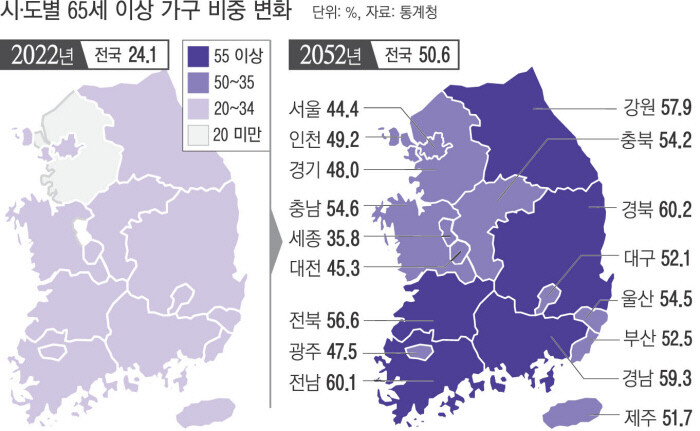
South Korea is poised to undergo a dramatic demographic shift in the coming decades, according to a recent forecast by Statistics Korea. The nation is aging rapidly, and household structures are evolving in ways that will significantly impact society.
By 2052, over half of all South Korean households are projected to be headed by individuals aged 65 or older, up from 24.1% in 2022. This surge in the elderly population will be most pronounced in rural areas, with provinces like Gyeongbuk, Jeonnam, and Gyeongnam expected to have the highest proportions of elderly households. Even urban centers like Seoul and Gyeonggi will see significant increases.
Concurrently, the number of single-person households is set to rise dramatically. While single-person households already account for 34.1% of all households in 2022, this figure is projected to climb to 41.3% by 2052. This trend is particularly pronounced among the elderly, with the proportion of elderly living alone expected to more than double.
The traditional nuclear family is also declining. While the number of married couples will slightly increase, the number of married couples with children will decrease significantly. This, coupled with a declining birth rate, will lead to a smaller average household size. By 2052, the average household size is expected to shrink to 1.81 people from 2.26 people in 2022.
The aging population and changing household structures will have far-reaching implications for South Korea. The country will face increasing demands for healthcare, social services, and housing for the elderly. Additionally, the shrinking workforce and declining birth rates will pose challenges for the economy and social security system.
Regional disparities are also expected to widen. While the Seoul metropolitan area will continue to dominate in terms of population, the growth rate will slow, and some provinces, particularly in rural areas, are projected to experience population decline.
Key findings from the report:
The proportion of elderly households will more than double in the next 30 years.
Single-person households will become the most common type of household.
The number of four-person households will decline significantly.
The average household size will shrink.
Population aging will be most pronounced in rural areas.
Regional disparities in population growth will widen.
These demographic changes will have profound implications for South Korea's social, economic, and political landscape. Policymakers will need to develop strategies to address the challenges posed by an aging population and a changing family structure.
[Copyright (c) Global Economic Times. All Rights Reserved.]






























